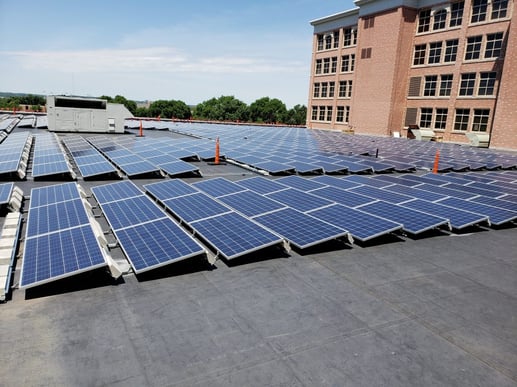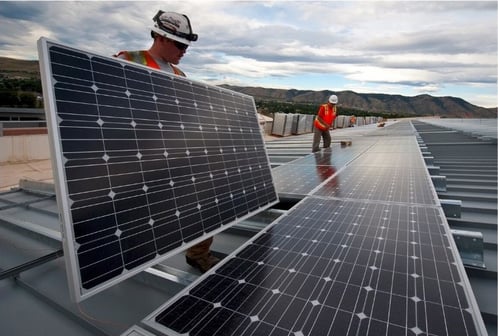As devastating as COVID-19 has been, there's a different lens from which we can view its effect on the world. How can businesses become more resilient?
While it's hard not to focus on just the next few months, it's important to think about the kind of world we want to live in after this crisis ends. One immutable constant is great leaders always want to prosper. Despite whatever challenges, they will continue to seek opportunities to grow their top and bottom lines. They will continue to build their brands and organizations for long term success.
Given you may be one of these leaders, there’s a growing secret across the U.S. and around the world. Solar power is slowly but surely becoming the way of the future – and businesses are primed to reap the benefits. If you sense shifting to clean energy is an intimidating undertaking, the following points should empower you more than anything.

Reasons to Consider Clean Energy
#1 Reduce Electricity Costs and Invest in Long-Term Savings
Using solar will lower the costs on your electric bill. Sure, the initial cost to install solar may be your biggest barrier. However, if you account for your average monthly electric bill cost, and budget for that expense on an annualized basis – after five, 10, 15, 20 years, the amount paid to the utility is a daunting reality that can be mitigated. Not to mention we should also factor in future rate increases over a 30-year period. The return on investment and savings over the lifespan of a solar panel system, depending on your energy consumption and the estimated production of the system, is a factor worth considering.
#2 Hedge Against Volatile Energy Costs
Purchasing solar can be much like investing in insurance. People pay for insurance because of the uncertainties of accident, injury, or death. Similarly, there are unknowns about the price of electricity through your utility and what it will cost down the road. According to the U.S. Energy Information Administration, over the last decade, the average price of electricity has increased about 4.6%. However, over those ten years, the standard deviation of commercial electricity prices was 0.24%. This signifies the great variability of energy costs over the last decade. Instead of relying on the ever-changing lows and highs of electric power prices, you can create a more predictable budget by locking into your rate for solar. Investing in solar can help companies avoid rising energy costs, and the uncertainty that comes with depending on power from the grid.
#3 Boost Public Relations and Attract Talent
As more and more companies switch to clean energy solutions, they further enhance their brands. In an article by the U.S. Chamber of Commerce Foundation, they indicate how practicing Corporate Social Responsibility (CSR) reaps multiple benefits, such as engaged employees, loyal customers, and positive public attention. In fact, it’s a purchase driver for many. “In a Nielson survey, 66% of participants said they pay more for products and services from socially responsible companies.” People are simply targeting more businesses that strive for better Environmental Social and Governance (ESG) practices. It captures the interest of younger generations, brings talent, and drives morale within the workforce. Internally and externally, people are motivated by businesses that look out for the greater good.
#4 Improve Your Property Value
Think about buying and owning a house. There are various ways in which one can invest in its worth and longevity. Perhaps it’s an addition that makes the house more attractive. These investments should increase the value of your home or building when you go to sell it. People decide to stop renting because, well…it’s money down the drain. Like buying a house, when you purchase solar, you become an owner of your electric bills. Just like renovations maximize a home’s value, installing solar and producing your own energy appeals to buyers, employees, and consumers alike. An article from Money.com references a study provided by Zillow: “On average, solar panels raise a home’s value by 4.1% across the U.S. — that’s a boost of $9,274 on a $226,300 home.” Even more so with larger buildings, there’s always going to be operation costs that go into running a facility. Just like the importance of fixing a leak or fine-tuning the plumbing, investing in solar relieves the long-term expenses of running a commercial building, thus making it more valuable.
#5 Commit to Sustainability
There's no way to avoid it. Helping the environment and leaving the Earth in better condition for future generations is a driving force for companies to consider clean energy. Businesses now have a duty to pay attention to CSR. In an article published by RE100, numerous companies are taking action — and explain why:
• IKEA has committed to “generate as much renewable energy as the total energy it consumes in its operations by 2020, as well as to consume 100% renewable electricity by 2025.” Why is that their goal? “(Our) investments into wind and solar energy generation contribute to the shift to a low carbon economy and, from a business perspective, help to secure our future as we become energy independent,” says Steve Howard, Chief Sustainability Officer.
• AB InBev recognizes that the “shift to renewables has the potential to drive a remarkable transformation in infrastructure, not only in the U.S. and Europe but also across emerging nations around the world. They have "pledged to secure 100% of purchased electricity from renewable sources by 2025,” says Brian Perkins, Global VP Budweiser.
• Microsoft’s Chief Environmental Strategist, Rob Bernard, makes a strong statement when asked why the company wanted to be 100% powered by renewables (achieved in 2014): “We believe there is a clear and urgent need for society to address climate change, and we recognize that our responsibility begins with our own actions. We are working to consistently reduce our carbon footprint, and we are committed to taking significant action to shape our energy future by developing clean, low-cost sources."
Investing in solar is a commitment to cleaner air and a brighter future. It’s a commitment to not only maintain the health of our planet but to sustain the economy.

Is Clean Energy Worth the Investment?
It has been estimated that the Internal Rate of Return (IRR) – a metric used to quantify the profitability of long-term capital projects – can be greater for solar systems than traditional equity investments in the stock market. Taking into consideration initial installation costs, scale of the project, future electrical price estimates, and so on, calculations for an IRR over a 30-year period typically range between 10-13% for solar, versus 7.4% for the S&P 500.
Of course, it’s important to assess the value of installation, or Levelized Cost of Energy (LCOE), which quantifies the cost of the electricity produced over a solar system’s lifespan – usually up to 30 years. This metric helps directly compare what you would otherwise be paying for utility charges. Again, this is where locking in a predictable rate can be crucial. One can expect to significantly gain from an investment like solar because it provides a solution to fighting rising electrical prices. There’s no longer a need to depend on the utility’s energy costs.
If you’re a business owner or key decision maker in your company, these should be highly compelling reasons to consider clean energy for your facility footprint.
In times of uncertainty, it’s our responsibility more than ever to fool-proof our infrastructure and buildings to withstand the social and economic costs of pandemics, global warming, and other unpredictable occurrences. Furthermore, there’s a need to think about the greater good of our decisions, their impacts, and what our world can become beyond the pandemic.
